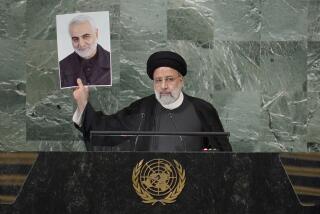Iraq Charges U.S. Is Pushing World to Brink of War : United Nations: In a speech to the General Assembly, Baghdad envoy accuses Bush of leading ‘Western imperialism.’
- Share via
UNITED NATIONS — In a hard-line response to President Bush, Iraq charged Friday that the United States and its allies are mobilizing military forces and bringing the world “to the brink of a devastating war” in an effort to control the Mideast’s oil wells.
Iraq’s deputy envoy, Sabah Talat Kadrat, accused the United States of “seeking in a dangerously coercive manner to impose its hegemony over the world.”
In an address before the U.N. General Assembly, Kadrat, subbing for his nation’s ambassador, who is ill, accused the Bush Administration of seeking to establish a “new imperialistic order” in the wake of events in the Soviet Union and Eastern Europe.
“The bitter truth is that this era is the era of the resurgence of Western imperialism under the leadership of the United States, at times with the tacit acquiescence of other great powers and at other times with their active participation,” Kadrat charged.
Raising the specter of war in the Mideast, he warned that the United States and its allies have mobilized forces “in a way that has had no parallel in contemporary history, thus bringing the entire region--nay, the entire world--to the brink of a devastating war.”
Kadrat proposed that the United Nations consider all the region’s problems, “Palestine, Lebanon, the (Persian) Gulf and others,” on the same basis.
If, in the wake of President Bush’s address to the General Assembly last Monday, any diplomats were expecting a glimmer of conciliation from Iraqi President Saddam Hussein’s representative at the United Nations, Kadrat’s toughly worded speech dashed that hope.
The United States and the Soviet Union joined Friday with Saudi Arabia and Kuwait in strongly condemning the speech.
Thomas R. Pickering, the U.S. ambassador, labeled Iraq’s arguments “a distortion, a deliberate misrepresentation.”
“Iraq has looted and pillaged in Kuwait, has tortured. Iraq is an outlaw. It violated the most basic (U.N.) charter obligations. . . . Iraq should get out of Kuwait, and it should get out now,” Pickering said in a rebuttal in the General Assembly to Kadrat’s remarks.
Speaking for the Soviet Union, Deputy Foreign Minister Vladimir Petrovsky said his nation categorically rejects Iraq’s assessment of events in the Mideast.
And referring to the U.N. Security Council’s sanctions against Iraq, he added that discussions in the council “represent the will of the council.”
But it was Kuwait’s representative, Dharar Razzooqi, the Kuwaiti Foreign Ministry’s director of international organizations, who delivered the most emotional response.
“He should be ashamed of himself what he said here,” Razzooqi said, referring to the Iraqi diplomat. “ . . . Who is violating the charter? Who is pillaging my country?”
His voice rising, the Kuwaiti diplomat looked toward the representative of Iraq: “I say to the representative of the Iraqi regime, we are going back, God willing--we are going back to Kuwait.”
Kadrat was a substitute for Abdul Amir Anbari, Iraq’s U.N. ambassador, who on Thursday suffered a serious nose bleed at the United Nations, forcing postponement of his planned address. The ambassador was taken early Friday to New York Hospital, where he was admitted by physicians.
Kadrat charged that the United States had embarked on a new era of Western imperialism.
“America and its Western allies are seeking, through this military, political and information campaign, to gain control over the oil wells and to impose imperialist political, economic and military hegemony over the world, and over Third World countries in particular,” he said.
Kadrat accused the United States and its allies of pursuing “one of the most dangerous and pernicious campaigns of disinformation known to history.” He charged that the Bush Administration is seeking to “put Arab mechanisms out of action” and to take control of the political situation in the gulf region.
“In a manner which has no precedent in the history of the United Nations,” he added, “the United States and its Western allies had the Security Council pass a series of subsequent resolutions, each of which has had the effect of causing further aggravation and escalation of the situation.”
More to Read
Sign up for Essential California
The most important California stories and recommendations in your inbox every morning.
You may occasionally receive promotional content from the Los Angeles Times.













